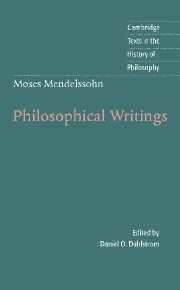Book contents
- Frontmatter
- Contents
- Acknowledgments
- Introduction
- Chronology
- Further reading
- Note on texts and translation
- Philosophical writings
- Preface
- Part I
- Part II
- On evidence in metaphysical sciences
- On the ability to know, the ability to feel, and the ability to desire
- On the question: what does “to enlighten” mean?
- Index
- Cambridge texts in the history of philosophy
Part I
Published online by Cambridge University Press: 05 June 2012
- Frontmatter
- Contents
- Acknowledgments
- Introduction
- Chronology
- Further reading
- Note on texts and translation
- Philosophical writings
- Preface
- Part I
- Part II
- On evidence in metaphysical sciences
- On the ability to know, the ability to feel, and the ability to desire
- On the question: what does “to enlighten” mean?
- Index
- Cambridge texts in the history of philosophy
Summary
Theocles, an English philosopher who inherited the name of that dear enthusiast known to us from the Earl of Shaftesbury's The Moralists, had left his homeland some time ago. The mixture of seductive imagination and French frivolity, peddled as metaphysics by so many of his countrymen, was so starkly at odds with his proclivity for rigor and fundamentals that he made the decision to renounce his fatherland, his tranquility, and his friends' embrace in order to search for a people that treasures accurate thinking more than free thinking. Germany seemed to him to hold out the promise of such a people. He read the immortal writings with which our countrymen have enriched the learned world in the past century, and people say that the soberness, indeed, the very dullness for which they are reproached by some petty critics, was one of the things that drove him to become acquainted with this nation. He went from school to school, and, in the guise of a curious soul simply passing through, he had the pleasure of attending all the gatherings of learned societies anonymously. He is supposed to have been more than a little astonished, however, by the specious and careless manner of our present philosophers. He apparently wrote his friends back in England that his hopes were betrayed and that even in Germany the philosophical dilettante had gotten the upper hand.
- Type
- Chapter
- Information
- Moses Mendelssohn: Philosophical Writings , pp. 7 - 130Publisher: Cambridge University PressPrint publication year: 1997

